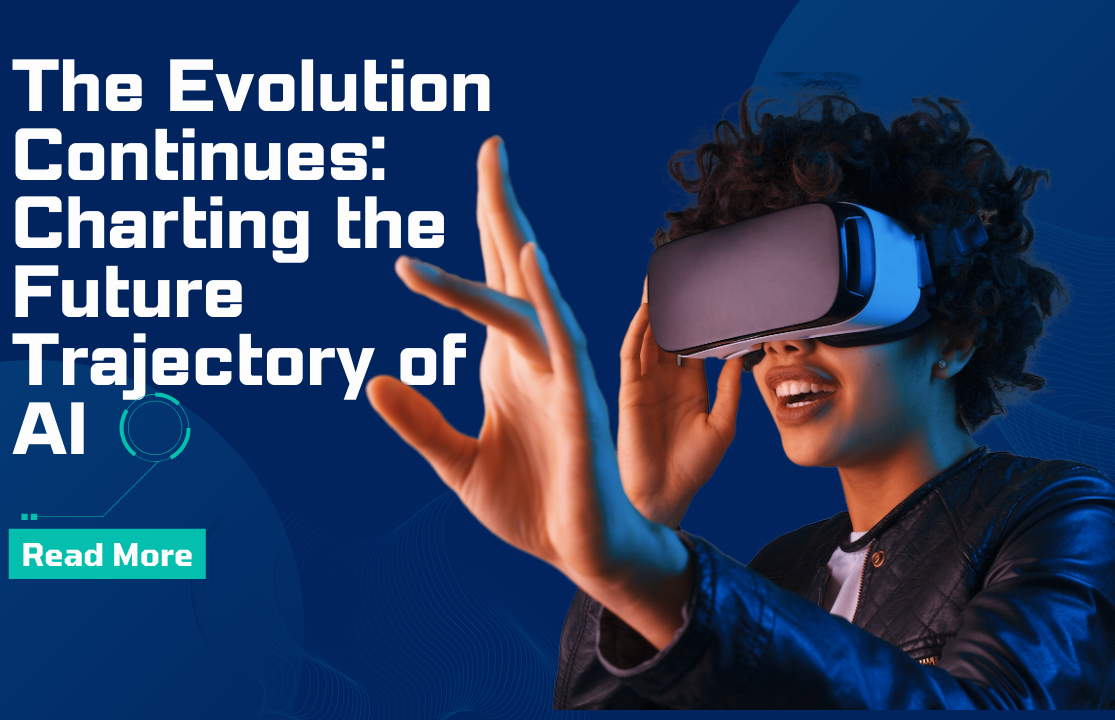Artificial Intelligence (AI) is a cornerstone in the rapidly changing field of technology, influencing how humans interact and perceive the environment. It's critical to examine the predicted course of artificial intelligence (AI) and identify the opportunities, difficulties, and revolutionary potential that lie ahead as we stand at the nexus of the present and the future.
The Current Landscape of AI
Let's consider the current state of AI before laying out the future. Computer vision, natural language processing, and machine learning algorithms have already pushed AI into many areas of our daily life. AI is now widely used in technology, from virtual assistants on smartphones to predictive analytics in the workplace.
Anticipating Advancements: AI's Quantum Leap Forward
1. Exponential Growth in Machine Learning
The continuous development of machine learning algorithms is closely linked to the future of artificial intelligence. Machine learning models are predicted to advance in sophistication as data volumes and processing capacity rise, allowing AI systems to make complex judgments and predictions with previously unheard-of precision.
2. Advancements in Natural Language Processing (NLP)
Significant progress is anticipated in the AI subfield of natural language processing. How we engage with AI will change when machines are able to understand, interpret, and reply to human language in a way that makes sense for the situation. This has significant ramifications for virtual assistants and chatbots, improving their ability to have more organic and meaningful discussions.
3. AI in Edge Computing
AI is not limited to centralized systems in the future. Edge computing is becoming more and more popular, where AI processes data locally on devices. This change improves privacy, lowers latency, and enables AI applications to work without interruption in settings with poor connectivity. AI integration into edge devices will open up new opportunities across a range of industries, including manufacturing and healthcare.
Challenges on the Horizon
We must recognize and resolve any potential obstacles as we foresee the use of AI in the future.
1. Ethical Considerations
AI's ethical ramifications are getting bigger and bigger. Careful consideration must be given to issues relating to algorithmic bias, privacy issues, and the ethical application of AI in decision-making processes. A responsible use of AI in the future will depend heavily on finding the ideal balance between innovation and morality.
2. AI Governance and Regulation
As artificial intelligence grows more pervasive in society, regulation and governance become critical. To reduce dangers and guarantee that AI technologies are in line with society values, it will be crucial to establish explicit rules for the creation and application of AI systems.
The Role of Chatbot Development Services in the AI Future
Chatbot Development Services is becoming an important component in this AI future that is being revealed. These services have the potential to significantly improve customer interactions, user experiences, and corporate productivity.
1. Personalized Customer Engagement
AI-powered chatbots will develop to provide more context-aware and tailored interactions. Across a range of businesses, the capacity to comprehend user preferences, predict needs, and offer customized recommendations will completely change client engagement.
2. Improved Natural Language Processing
Developments in Natural Language Processing, which is crucial to the creation of chatbots, will lead to dialogues that are increasingly complex and human-like. Users can anticipate that complex questions will be understood by chatbots, resulting in more productive and meaningful exchanges.
3. Integration with Emerging Technologies
Virtual reality (VR) and augmented reality (AR) are two more cutting-edge technologies that chatbots are poised to smoothly integrate with. Users' interactions with AI-driven chatbot services will be revolutionized by this integration, which will produce immersive and interactive experiences.
Conclusion: Navigating the Future of AI
The title "The Evolution Continues: Charting the Future Trajectory of AI" captures more than just the continued exploration of AI's frontiers. The future of artificial intelligence (AI) seems to be revolutionary, with exponential growth in machine learning, advances in natural language processing, and the emergence of edge computing all predicted. But one must tread carefully when navigating governance issues and ethical dilemmas.
Chatbot Development Services play a crucial role in influencing our interactions with artificial intelligence within this context. They are at the forefront of the AI revolution thanks to their involvement in enhanced natural language processing, personalized customer engagement, and integration with emerging technology.
It's critical that we stay watchful as we steer this course into the future and make sure that AI development reflects our moral principles, solves ethical issues, and advances a society in which technology is used for the greater good. As the journey proceeds, artificial intelligence (AI) promises to lead to a technologically advanced world that is steered toward responsible development and innovation.






Comments